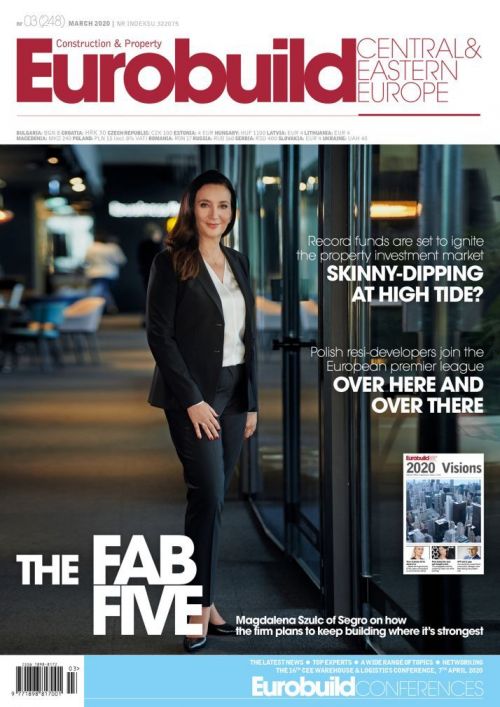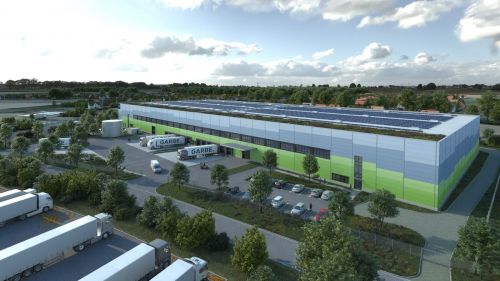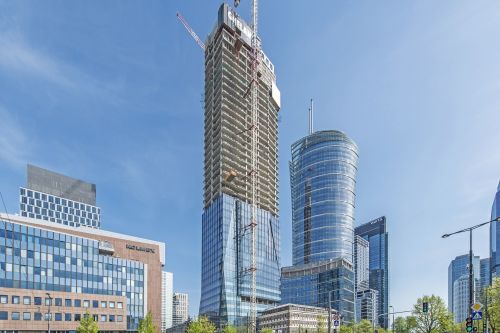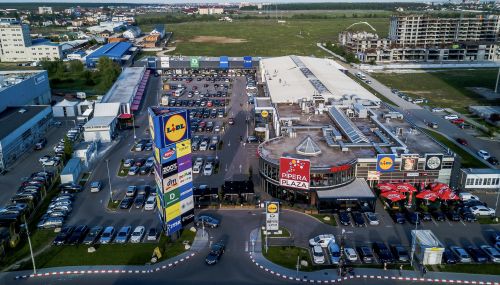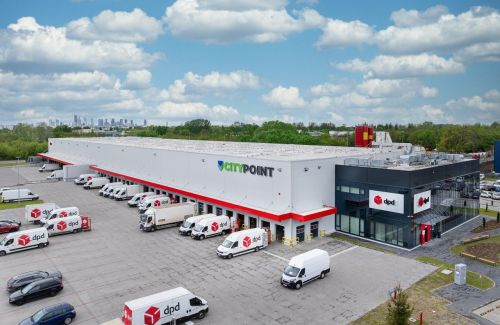Diverse and special
Construction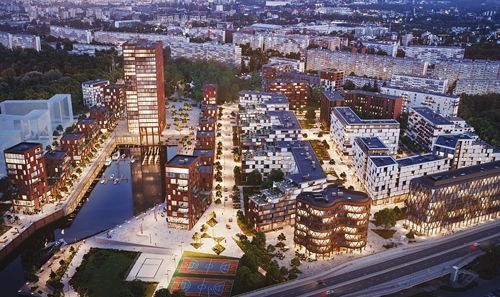
Tomasz Cudowski, ‘Eurobuild CEE’: In two sentences, tell us what 2019 was like on the Polish construction market?
Dariusz Grzeszczak, partner and CEO, Erbud: It was a stable year, which, hopefully, signals a few years of normalisation ahead of us. Basically, the prices of building materials and labour are no longer rising so erratically, so we can relax a bit when working out our project budgets and taking part in tenders.
But you still need to give yourself some kind of margin just in case?
Plus or minus 5 pct is enough. Three years ago there were some huge jumps in prices, so in 2017/18 there was a great deal of balance cleaning to do for construction firms. Now we have EBITDA profit of PLN 58 mln at Erbud for 9M 2019 [this conversation took place at the end of January 2020, when the results for the whole of 2019 had yet to be published – editor’s note]
However, it’s not all a bed of roses: large EU orders are coming to an end, the labour shortages are still a huge issue...
This is true, but we have prepared for it. Sector and geographical diversification is our recipe for a more blissful existence.
You are diversifying in an era of specialisation?!
Yes, we are and we already have good results from this. Erbud has so far been mostly present on residential construction sites but we have gradually entered the contracting services market; we also take on many foreign contracts, for which we are paid in euros, which gives us some resistance to the economic fluctuations in our country. However, diversification does not preclude specialisation if it takes place on a sufficiently large scale – each of our branches specialises in a different sector, since only then can you propose a market price that will be accepted by the client. I’m also pleased that, after several years of stagnation, large-scale investment in renewable energy sources has been unblocked – and thus we are winning many contracts to construct wind farms. Around 15 pct of our revenues come from building renewable energy projects.
But the energy sector itself is in dire need of modernisation…
This is true – things couldn’t be worse. We’ve seen a huge slowdown on this market – no investment, no public strategy, no development plans. We’re also worried about the unpredictability of electricity prices – this represents a huge challenge for our sector when it comes to drawing up budgets. Just like with the rising labour costs, the increase in the minimum wage has meant that contractors have had to submit higher bids in tenders. However, this is problem faced by the entire economy, not just by our sector or by Erbud.
By the way, how are you doing when it comes to public tenders?
Better and better – they already make up around 40 pct of our revenues. This is also down to the market stabilising and the fact that you can finally make money. There are no longer huge discrepancies between the budgets of investors and contractors as a result of tenders taking many years with investors refusing to update their valuations. The whole process is much more efficient now, so such discrepancies have become rarer.
What else in your opinion has most changed the construction market over the last year?
On the practical side, proptech systems have certainly made an impact. I was pleased to see how popular BIM has become as it is already present in virtually all sectors of the market and significantly improves each stage of a project: the calculations, the design, the construction, the fault elimination... I would say only a little tongue-in-cheek that 30 years ago a similar revolution was caused by Excel: whoever wanted to bid for orders and work with other players on an investment suddenly had to master the use of a spreadsheet – rather than going through the whole process of retyping the data sent in a text file or by fax. BIM is having a similar impact, and it is the 21st century equivalent. It’s a common platform that saves time and forces everyone to speak the same language.
What about prefabricated construction? It was all the rage a few years back.
I’m rather sceptical about it – the materials and assembly costs are still prohibitive and are not offset by the savings resulting from the reduced construction time. I can guarantee that if prefabrication had paid off in at least some market segments, every construction company would already have its own production plant and would be heavily promoting it. However, not much has happened on this front over the last twenty years.
You were talking about staffing issues earlier...
This is actually the only reason why companies are not growing faster and are not going for more contracts. The market for projects is hot, so all employees – qualified and unskilled, of all levels and specialisations, whether they are the best or the worst in their fields – can get a job. So it’s very difficult to build a team to support your next project and it’s impossible to keep increasing salaries indefinitely.
In terms of revenue, Erbud is one of the top five construction companies today – and it’s the only company with Polish roots in its group – and yet you started out 30 years ago as a family company with just two people…
Do you know how it really started? My father kept a diary of contacts with colleagues he had got to know over decades of work in state-owned construction firms. And this is how it is today: our people are Erbud’s most valuable resource. And that’s not just a cliché: we make sure that our employees feel good working with us, and it is not uncommon for people to stay working with us for 20 or 25 years. We started on the German market and we are still active there, because what has been our strategy from the beginning is to take advantage of the booms on different markets and in different segments. And, as you can see, it has had been very effective.
You’re probably the only construction firm that has established a charity to support young people leaving children’s homes.
It’s worth emphasising that this is not a just a fund for raising money or buying things. We support these young people all through the year, helping them take their first independent steps; and we employ psychologists. Our employees are also involved in such activities, taking on the role of mentors for the young people. They’re probably quite effective, because later on, some of the people we help – after they’ve got the right qualifications – apply for jobs with us.
How will you be celebrating the company’s 30th anniversary?
We’re planning a big family picnic.
Co-founder of erbud
Dariusz Grzeszczak graduated from the Gdańsk University of Technology in mechanical engineering. In 1990, together with his father, Eric Jan Grzeszczak, he founded Erbud and has been a member of the board since 1993. In 1993–1995 he was a vice-president of the VdPD – the Association of Polish Service Companies in Germany. Since 2011 he has been a member of the Polish Business Council. In 2012 he became a member of the board of the Polish-German Chamber of Industry and Commerce. As the CEO of Erbud, he is responsible for developing the group’s strategy, liaising with the supervisory board and investor relations. He also supervises the company's subsidiaries, including those in Germany.
Łukasz Michorowski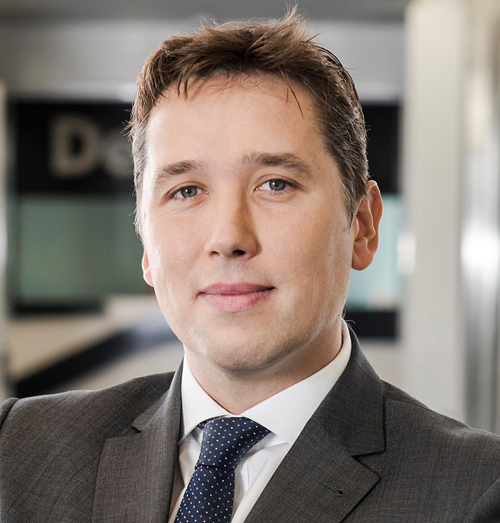
associate partner in the audit department for construction and real estate at Deloitte
More measured and more diverse
Last year the construction sector in Poland once again recorded an increase in construction and assembly output, but this time of 2.6 pct compared to a 17.9 pct rise in 2018. The slowdown in growth compared to the previous year is mostly due to the height of the market at the end of 2018. The construction of large road and rail infrastructure projects as well as the strength of the current economy in the construction market have been crucial for the sector, and this includes in the residential, industrial and commercial segments.
The growth in construction output, unfortunately, has not resulted in any increase in the overall profits for the largest players on the market, as can be seen in Deloitte’s ‘Polish Construction Companies 2019 – Key Players, Key Growth Factors and Development Prospects for the Sector’ report. Completing contracts that were acquired by companies in 2015–2017 remains a huge challenge for the sector. Due to the significant price rises in materials and labour costs over the last two years, the margins for such projects have been squeezed and many companies are now unable to stick to the budgets on which they initially bid. Small and medium-sized construction companies are coping much better with this challenge, since, because their services are in demand from the largest market players, they have been able to increase the prices of their services and maintain their profitability. The main difficulties faced by those in the sector, according to a survey by GUS [the Central Statistical Office], are the continuing rise in wages, the low supply of qualified employees and the rising prices of key materials. Legal changes were introduced in 2019 to allow contracts to be revalued in line with rising costs (such as those due to the hikes in material prices). Unfortunately, these changes apply only to new contracts and do not resolve the problems faced by those who secured their contracts before the new law came into force. The sector’s challenges listed so far are also having an impact on public investment – many tenders could not be closed in 2019 as the bids submitted were often much higher than the investor’s budget. As a result, the GDDKiA [General Directorate of National Roads and Motorways] as well as PKP PLK [the Polish national railways’ infrastructure manager] have revised and raised their investment budgets, to PLN 142 bln and PLN 76 bln, respectively.
The construction market is unlikely to slow down this year. Many projects that are currently at the design stage are soon to get underway. Firms will maintain a high level of processing, especially when it comes to major road projects, in particular on the rail infrastructure market. Looking into the long-term, construction services to maintain the existing infrastructure will become more important. No significant slowdown in residential and commercial projects is expected to take place. The residential market in Poland has still not reached the average output for developed EU countries – it is at a current level of 375 apartments per 1,000 inhabitants, whereas the EU average is around 450 apartments. The ongoing boom in the residential market is the result of low interest rates, a stable labour market (employment security) and the overall growth in the affluence of the Polish population.
Turning to the challenges that lie ahead, retaining qualified staff will remain a key issue going forward, which will also mean rising labour costs. This may also take on acute importance as the German market opens up to workers from Ukraine.
The rise in the prices of key materials began to slow in H2 2019; however, since high levels of development are expected in 2020 and 2021, the market could still experience periodic jumps in key material prices due to rapid increases in demand.
Considering all the factors that could impact the profitability of the sector, investment and innovations that enhance the efficiency of construction work such as BIM will become more important and large construction groups will be diversifying the type of services they provide and the locations where they work.
























